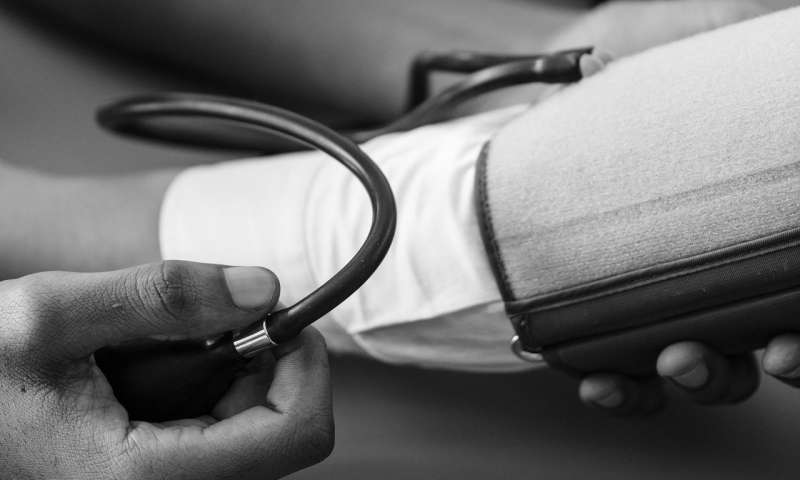This article has been reviewed according to Science X's editorial process and policies. Editors have highlighted the following attributes while ensuring the content's credibility:
fact-checked
peer-reviewed publication
trusted source
proofread
Trial reports mixed results with nerve ablation for high blood pressure

A new system that uses dehydrated alcohol to deactivate certain nerves surrounding the kidneys' arteries in order to control high blood pressure met its primary endpoint—lowering blood pressure at three months as measured with a 24-hour ambulatory systolic blood pressure monitor—in a pivotal Phase III trial presented at the American College of Cardiology's Annual Scientific Session.
The study is the largest randomized controlled trial to date assessing alcohol-based technology for deactivating connections between the kidneys and the nervous system involved in regulating blood pressure, an approach known as renal denervation. Although the trial reported positive results overall, researchers said the full study findings present a more complicated picture.
"We saw a modest but statistically significant difference in the primary endpoint, but there were no significant differences in other measures of blood pressure, including office systolic or diastolic blood pressure," said David E. Kandzari, MD, chief of the Piedmont Heart Institute and cardiovascular service line, director of interventional cardiology at Piedmont Heart Institute and chief scientific officer for Piedmont Health Care in Atlanta and the study's lead author.
"Further, there were unexpectedly large reductions in blood pressure observed in the sham control group that merit further study."
Almost half of U.S. adults have high blood pressure, or hypertension. Although there are multiple medications and lifestyle modifications that have been proven to help reduce blood pressure, it is estimated that blood pressure is not adequately controlled in over 70% of people with hypertension.
In recent years, the U.S. Food and Drug Administration (FDA) has approved several renal denervation technologies designed to deactivate renal nerves that mediate hypertension via minimally invasive procedures using either radiofrequency energy or ultrasound energy.
The trial assessed the performance of a newer technology, the Peregrine System, which applies dehydrated alcohol to the nerves in a way that could result in more complete and effective denervation than previous technologies have.
To test the system's efficacy, researchers randomly assigned 301 study participants to receive either renal denervation with the Peregrine System or a sham procedure. Participants assigned to the sham procedure were given sedation or sensory deprivation so that they would not know whether they had undergone the ablation procedure or not.
At the start of the study, all participants had been prescribed between two and five blood pressure medications but still had high blood pressure. For the study, high blood pressure was defined as systolic blood pressure between 150–180 mmHg and diastolic blood pressure above 90 mmHg as measured in a doctor's office, as well as an average systolic blood pressure between 135–170 mmHg as measured with a 24-hour ambulatory blood pressure monitor.
Since blood pressure measurements taken in a clinic are often higher than those taken at home or while sleeping, 24-hour ambulatory blood pressure (measured with a cuff that automatically assesses blood pressure at regular intervals over a 24-hour period) can be a more accurate reflection of a person's blood pressure status.
At three months after the procedure, 24-hour ambulatory systolic blood pressure dropped by 10 mmHg, on average, among participants who received renal denervation and by 6.8 mmHg, on average, among those who received a sham procedure. The between-group difference of 3.2 mmHg was statistically significant in favor of renal denervation, thus meeting the trial's primary endpoint.
However, there were no significant differences between the two groups in terms of systolic or diastolic blood pressure as measured in a doctor's office at three months, a surprising finding that researchers said was difficult to explain.
"Typically, if we observe reductions in one measure of blood pressure, we expect similar declines across the board in other measures," Kandzari said. "In this trial, meaningful reductions from baseline were achieved with renal denervation across all measures, but the potential difference is muted by large declines in the control group. There are still many unanswered questions coming from this study in terms of why we find the results that we do."
It is also unclear why the study participants who received a sham procedure experienced such a substantial drop in blood pressure when they did not receive any additional intervention as part of this trial, researchers said.
Previous renal denervation trials have reported similar patterns with evidence that participants in those trials took their blood pressure medications more consistently during the trial than before it, which could account for the improvement. In the new trial, researchers assessed medication adherence with blood and urine tests and did not see any particular differences in drug adherence between groups that would explain the finding.
Overall, researchers said the ablation procedure appeared safe with no major clinical events, such as death, stroke or hypertensive crisis. One patient experienced a small tear in a blood vessel during the procedure.
Kandzari said that researchers plan to work with Food and Drug Administration (FDA) reviewers to assess what the trial results might mean from a regulatory perspective and determine next steps.
This study was simultaneously published online in Circulation at the time of presentation.
More information: Kandzari will present the study, "Effect of Alcohol-mediated Renal Denervation on Blood Pressure in the Presence of Antihypertensive Drugs: 3-month Primary Results from the Target Bp I Randomized Trial," on Monday, April 8.



















